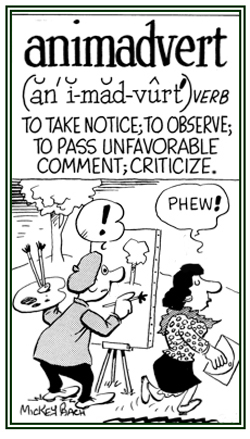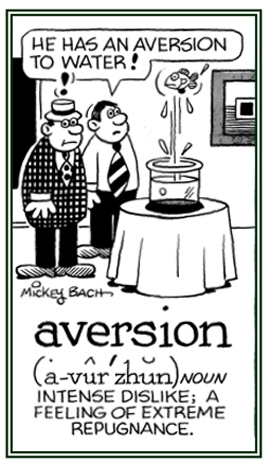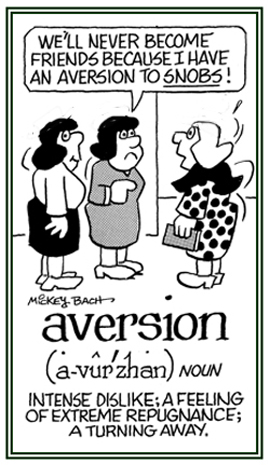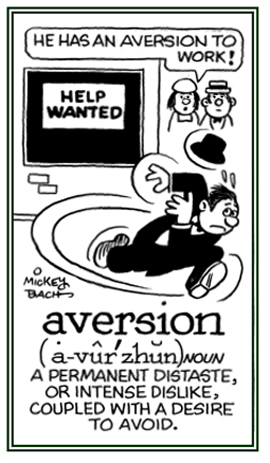vers-, vert-, -verse, -version, -version, -versation, -versal, -versary, -vert, vort-, vors-
(Latin: bend, turn)
2. To turn one's mind or attention to; to observe and to be aware of: While standing on the seashore, Patricia animadverted the birds that were flying over the waves.
3. Etymology: from Latin animadvertere; literally, "to turn the mind toward"; "to notice, to pay attention to", from animus, "mind, mental" + advertere, "to turn toward, to turn to"; from ad-, "to" + vertere, "to turn"; either in a negative manner or a more positive way.

Go to this Word A Day Revisited Index
so you can see more of Mickey Bach's cartoons.
2. A celebration or other commemorative ritual marking the date of an important event.
3. Etymology: from Latin anniversarius, "returning annually", from annus, "year" + versus; past participle of vertere. "to turn". The adjective came to be used as a noun in Church Latin as anniversaria dies with reference to saints' days.
The year rolls around to bring the anniversary of birth, marriage, or some other event; and this "turning" of the year is the literal meaning of the word anniversary.
Atmospheric inversion usually refers to an increase in temperature with increasing altitude, which is a departure from the usual decrease of temperature with height.
In other words, atmospheric inversion is a reversal in the normal temperature lapse rate, the temperature rising with increased elevation instead of falling.
Usually within the lower atmosphere (the troposphere), the air near the surface of the Earth is warmer than the air above it, largely because the atmosphere is heated from below as solar radiation warms the Earth's surface, which in turn then warms the layer of the atmosphere directly above it.
"I do not approve of liquor in any form and I am even averse to drinking wine."
2. An abhorrence of something or someone: Tracey has an aversion for people who smoke and so she avoids being near them or in the same area where they are.



Go to this Word A Day Revisited Index
so you can see more of Mickey Bach's cartoons.
Cathy averted her head so her mother couldn't see her face where she had bruised it when she fell on the slippery ice.
2. To ward off, to prevent, or to abstain from happening: Shirley averted an accident by driving her car carefully on a narrow street that was undergoing reconstruction, however a man who was driving in the same lane didn't avert the barrier on the side and so he had a bad accident.3. To keep from happening or to avoid something: The quick arrival of the fire fighters averted a major forest fire.
A man who averts danger turns it away from himself.
Tim averted his eyes by turning them away.


